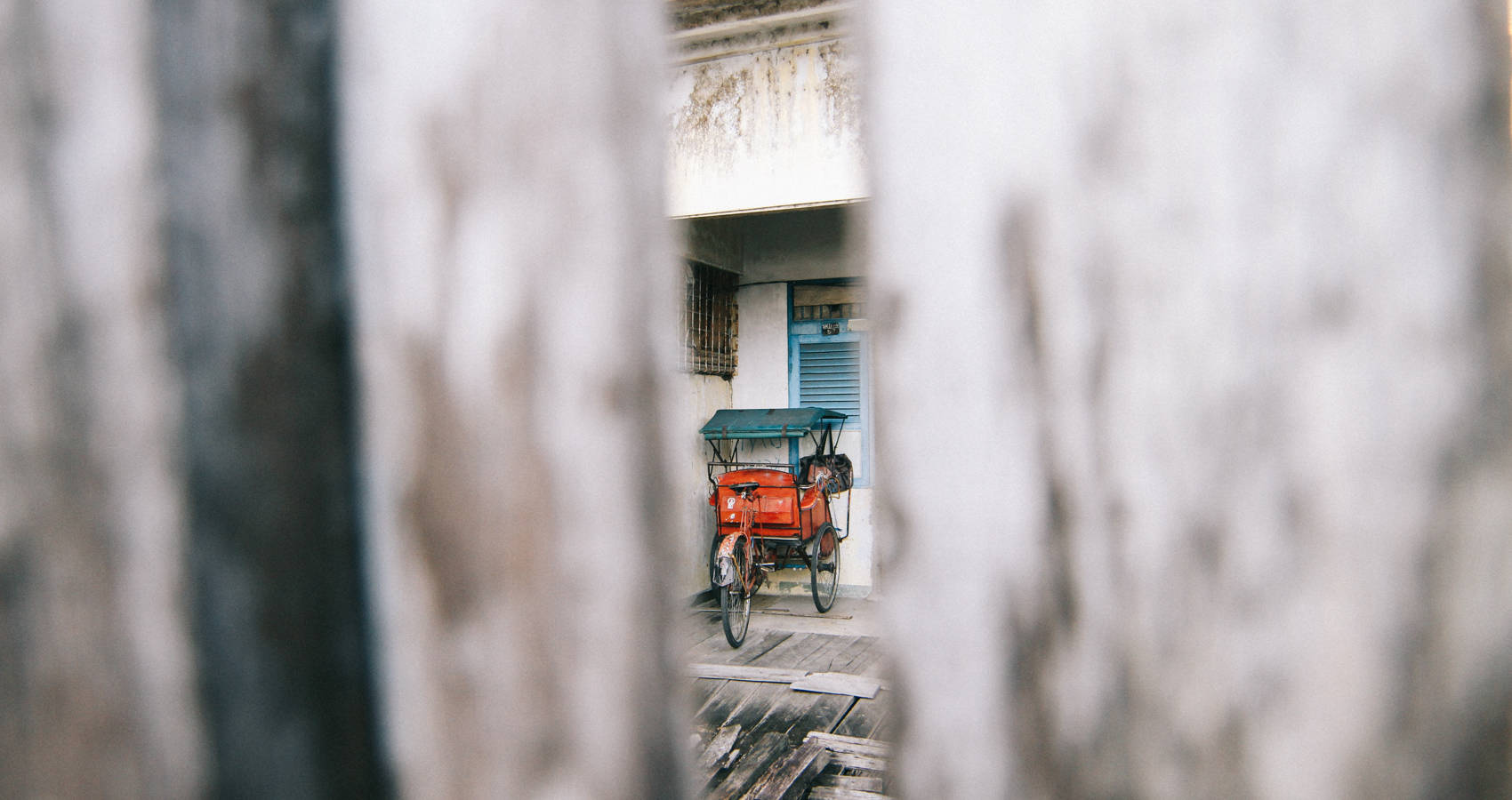The Becak Driver
written by: Kathy Whipple
I’d been in Surakarta for a week when I began to notice the old becak driver in the corner by the batik market or parked across from the train station—sometimes near the sultan’s palace. He always greeted me, often yelling from across the street.
“Hello, Miss. Transport?”
I wondered if the old man lived in his becak, a modified bicycle with a two-seat carriage he used to transport passengers. I noticed him asleep in it most evenings as I made my way to the guesthouse. The man lay scrunched into the seat, his legs raised above his head, calloused bare feet dangled over the carriage sides, and sweat dripped down his face. He woke as my footsteps approached. He straightened himself and ran his hand down the front of his shirt to tidy the wrinkles.
“Transport, Miss?”
“Tidak. Jalan-jalan,” I said, using my limited Indonesian skills to tell him, “No. I’m walking.”
I wondered if he even could transport me. He seemed so frail. His gaunt face was deeply lined, his shoulders hunched, arms thin as bamboo stalks, and his legs gnarled and bowed. It was impossible for me to guess his age as the harsh tropical sun had hardened his skin.
Many days he smiled broadly and asked his hopeful question. And I declined his ride, preferring to walk. He’d nod his head to show understanding and repeat, “Jalan-jalan.”
Late one night, several weeks after I’d arrived, I attended a wayang kulit performance at the palace theater. Shadow puppets danced behind a screen, and fought with swords in synchrony to the haunting percussion of the gamelan music. Cymbals and gongs, the two-stringed, bowed rebab, that reminded me of a feral cat under the window on a full moon. The crowd cheered or booed appropriately as Prince Rama tried to rescue his wife Sita from the demon king Ravana. They laughed at the monkey warrior Hanuman’s silly antics and roared louder when the three clowns farted.
Enthralled with the performance, I hadn’t noticed the storm raging outside. When the final gong sounded and the stage darkened, I filed out with the crowd to find a torrential downpour. A tropical rain pelted me with a force strong enough to hurt. The locals scattered quickly. They ducked into vehicles. Donned plastic ponchos and left on motorbikes with deft efficiency. Like bats from a cave at dusk. The water ran in rivers through the streets. I began to walk, back to my guesthouse, covering my face with my hands to protect it. The streets were eerily empty. I sloshed through water up to my calves. Rain-soaked clear through my clothing. My sundress clung to my legs.
I’d gone only a short distance when I heard his voice above the roar of the rain.
“Transport, Miss?”
I held my hand above my eyes to see through the deluge. My becak friend had drawn down the plastic sides of the carriage and stood pointing to the dry insides. He waved me his way with enthusiastic vigor.
“Yes, please!” I ran to his shelter. “Terima kasih—thank you.”
“Jalan-jalan?” He teased.
“Not tonight,” I laughed.
I ducked into the seat. He snapped the plastic shut around me, mounted the bike, and pedaled with a fierceness belying his frailty. The rain beat upon him and never let up. He pedaled through standing water several inches deep. The water sprayed in arches from the tires. Inside, my wet hair and clothes dripped a puddle on the seat. The rain drummed with increasing decibels on the top of the carriage.
Shortly, we arrived at my door. I jumped from the becak and ducked under an awning. I handed the driver a fistful of wet rupiah notes. He shook his head and tried to hand it back.
“No charge. You are friend,” he said.
I nudged his hand away.
In the end, my insistence outlasted his and he accepted my offering before peddling back into the rain. Illuminated by a dim streetlamp, he raised his arm in a final farewell as he rounded the corner.
After that night, I began to take him up on his offer for a ride. He showed me the city from back streets and alleyways, pointing out the best bakso soup vendor, the shoe-repair shop, an ancient mosque absent from any guidebook.
We muddled through what small conversations our language skills allowed. We both had grandchildren. And were the same age. I was correct, he did live in his becak and sent the money he saved on rent to his son in Jakarta. It was okay, he said. He was old. It made him happy.
One clear day he showed me the view of Mount Merapi from the highest point in the city. “Big eruption in 2020,” he said. “Many people die.”
“How horrible.”
“Wife too.”
“What? Your wife?”
“Yes. Istri saya.”
“I’m so very sorry,” I said.
We both teared up until he mounted the bike and pedaled us on. When he deposited me safely home, I tried to pass him a few extra rupiah notes. At first, he refused. But then I said a phrase I learned for such an occasion. “Ini untuk anak-anak.” It’s for the children.
“Oh, for the children,” he repeated.
Then smiled the broadest grin I’d ever seen.
“I happy you ride,” he said.
“Me too, my friend.”
- The Baby Cried - November 2, 2025
- Her Son - April 25, 2025
- Temporary Christmas - December 14, 2024



